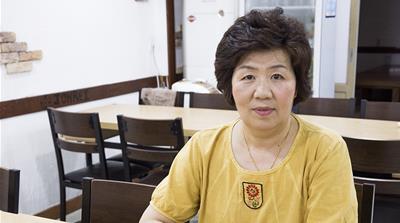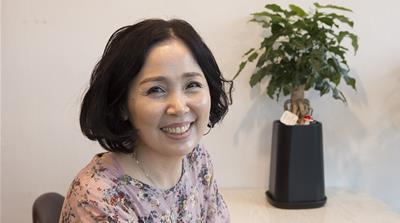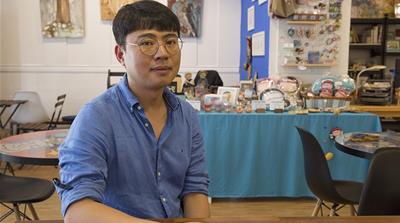Residents of Korea’s Jeju island talk about Yemeni refugees
Jeju, South Korea – More than 550 Yemeni nationals have arrived on South Korea’s Jeju Island since April seeking asylum and refugee status.
Unlike mainland South Korea, Jeju offered visa-free arrival for various nationalities, including Yemenis, to boost tourism.
But the arrival of Yemenis, mostly from Malaysia – to which they fled from war-torn Yemen – sparked an online outcry and protests on the island, as well as the capital, Seoul.
The refugees are barred from leaving Jeju and entering mainland South Korea and are only permitted to work on farms, the sea or restaurants, often doing long hours of manual labour. Some complain of not being paid after working for more than a month.
More than 700,000 South Koreans filed an online petition urging the government to stop its visa-free policy for Yemen.
Protesters demanded the government to refuse asylum and deport the Yemenis.
A recent survey of more than 500 Jeju residents revealed almost 90 percent felt insecure about going outside since the arrival of the Yemenis.
Al Jazeera spoke to Jeju residents to see how they felt about the asylum seekers and what the Korean government’s next steps should be.
Ko Minja, 59, restaurant owner
People around me are sceptical about the visa-free policy. I think the government should accept refugees based on their nationalities and avoid people from countries that have terrorism issues. The fact that Jeju accepted these people is causing fear and anxiety among the residents.
 |
| Ko Minja has never met a Yemeni but says she is scared of them [Faras Ghani/Al Jazeera] |
The Yemenis are scary. They will rape our women, take our jobs and take over the country.
I’m scared of going to the areas where they are living. They are known for reckless behaviour. If I go to places where they are based, I’m very scared. Employers are reluctant to hire them because they are scared, too.
Lots of people are telling me that this visa-free policy is a problem and might cause terrorism problems for Jeju island in the future.
(Minja has never met a Yemeni or been to the areas they are living in. She told Al Jazeera she was basing her comments on what others had told her).
Ko Tae-su, 62, store owner
As a Korean who knows about war, I believe the government’s action to accept refugees is an understandable one and not a bad move. But we have no information about them. We don’t know who they are.
I don’t think they are all bad people. I think deporting them will be too harsh and not a good idea. I think there needs to be a conversation between the government and Jeju’s residents. They should start a dialogue to solve the issue. And I feel a lot of people around me have the same thoughts.
Joi Nok, 50, cafe owner
 |
| Joi Nok is proud of her Yemeni friend who designed a menu for her cafe [Faras Ghani/Al Jazeera] |
I’ve been on Jeju Island for about four months and have managed to make a Yemeni friend who visits my cafe daily.
He’s learning Korean and he practises it with me. And I’m learning about Yemeni culture.
I think the government should educate these asylum seekers and tell them about Korean culture. A lot of women and children here are scared of these Yemenis because they walk around in groups. They should avoid that.
I finish work at 10pm and when I see them walk around in a group, I get scared too.
Also, they are Muslims and have a prayer culture. But they should make a bigger effort to learn about our culture so we can live together.
Gunwoo (name changed), 60, taxi driver
We need to learn from the Korean War – how other countries stepped in to help us out.
Based on that, we should accept these asylum seekers, but not everyone. I don’t think we can accept everyone but we should sort this out quickly and accept some of them.
Park Won-jo, 38 advertiser
 |
| Park Won-jo blames fake news for the hatred towards these asylum seekers [Faras Ghani/Al Jazeera] |
I think a lot of people and organisations here are overreacting to the issue because there is a lot of fake news around. People are worried and concerned because of that.
We should provide them with good conditions and shelter because they are from a country devastated by the war. I hope they can get their wounds healed here in Korea.
This is the first time Jeju residents are going through this situation, that’s why they are a bit surprised. I haven’t come across any Yemenis yet but I get my information through social media. There is a lot of advertising going on to help these people.
Lee Jung-hoon, 65, pastor
I feel for these people. They need help. I went to the immigration centre and told them I’m ready to help if someone needs it. I have given shelter to five Yemenis and I’m also teaching them Korean because they need to interact with the community to allay those fears.
The bible tells us to take care of the vulnerable around you. And that’s exactly what I’m doing. These people now need jobs. The government has only allowed them three types of jobs – farming, fishing, restaurant [workers] – and banned them from working anywhere else because they think these people will steal the locals’ jobs.
Sand Woon-hyun, 28, sales agent
 |
| Sang Woon-hyun is worried about the island being crowded because of the asylum seekers’ arrival [Faras Ghani/Al Jazeera] |
I don’t have any bad feelings for these people but if I talk to people around me, they are quite against them because of the religion and their security fears.
I think the government should take time in evaluating these applications. We have seen what’s happened in Europe with countries that have accepted refugees from these countries.
A lot of people on Jeju are very conservative and the local media is depicting these people in a negative way.
For me, the issue will be population growth, traffic jams and public facilities being put under strain because of an increase in the island’s population.
Additional reporting by Hayeon Kim




